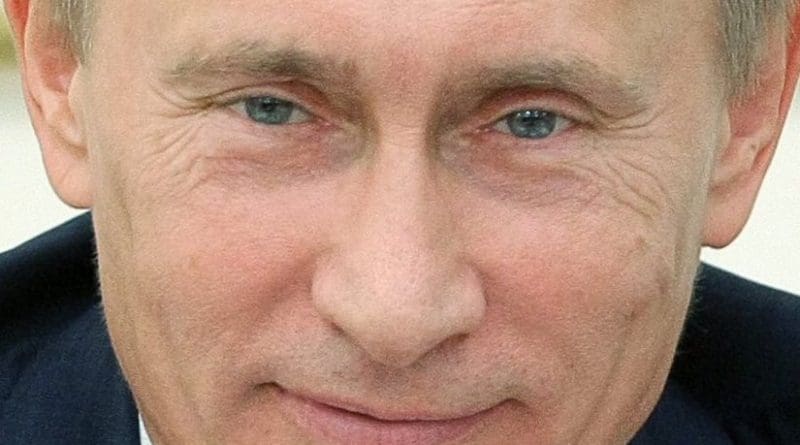Putin Pushes For Integration Into Eurasian Economic Community
By VOR
By Svetlana Andreyeva
Russian Prime Minister Vladimir Putin has announced a new integration project – the Eurasian Common Economic Space (CES).
In his article published by the Izvestia newspaper on Tuesday, Putin focuses on the future of Russia, Belarus and Kazakhstan in the wake of the launch of the three countries’ Customs Union and their common economic space. “We offer, Putin writes, a model of a powerful supranational body, which could turn into one of the modern-day world’s major hubs and play an effective role in linking Europe to thriving Asia-Pacific region. Among other things, this stipulates a closer coordination of economic and currency policy and the creation of a full-fledged economic community – something that should be fulfilled on the basis of the Customs Union of Russia, Belarus and Kazakhstan and the three’s Common Economic Space, which will begin to function on January 1, 2012.”
During the 2011 Business Customs Forum earlier this year, Putin specifically stressed the necessity of creating the Eurasian Economic Community, expressing hope that a declaration to this effect will be signed in 2012. 2013 should see the launch of this integration project, which will become a new stage on the way to global integration, Putin said. Echoing him is Yuri Solozobov, of the Moscow-based National Strategy Institute, who says that the project complies with the current global economic environment:
“Creating a powerful integration community between the two economic superpowers of the 21st century, the EU and China is a very worthy aim, Solozobov says. Like other CIS countries, Russia now faces a major geopolitical choice, he adds, citing a possible split-up of these CIS states and their subsequent integration into Europe and China. Also on the table is the creation of a powerful geo-economic center, like the three-party Customs Union and the Common Economic Space. This will be transformed into the Eurasian Economic Community, with a political alliance due to become a natural form of integration. This is something that was used during the creation of the current European Union – a process that was fulfilled without damaging national sovereignty and economic independence of the countries. The formation of the Eurasian Economic Community will also be in line with these principles,” Solozobov wraps up.
In his article, Vladimir Putin says, in particular, that “removing migration, border and other barriers for CES citizens will imply the opportunity to choose a place of residence, receive education and work without restrictions.” This will also be the case with business people of Russia, Belarus and Kazakhstan, who will get a free hand in terms of job opportunities. “We are creating a colossal market with more than 165 million consumers, with uniform legislation and free movement of capital,” Putin goes on to say, adding that “the combination of natural resources, capital and strong human potential will enable the Eurasian Economic Community to be competitive on global industrial, technological, investment and job markets.” Putin also points out the Eurasian Economic Community’s role in providing stable global development, which is also tackled by “other key players and regional structures, such as the EU, the US, China and APEC.”
Commenting on Western analysts’ back-to-the-USSR arguments in connection with his article, Putin said that restoring or imitating the Soviet Union is out of the question. Sergei Mikheyev, of the Center of Geopolitical Technologies in Moscow, says that the Eurasian Economic Community gives a chance to return to internal markets in Russia, Belarus and Kazakhstan, which closely interacted in the Soviet era:
“The Soviet Union’s collapse led, among other things, to the disappearance of the internal market in the three countries with all that it implies,” Mikheyev says, citing a decline in industrial production there. “In this regard, the Eurasian Economic Community’s goal is to help restore the internal market in Russia, Belarus and Kazakhstan as soon as possible,” he concludes.
Putin also voiced hope that the Eurasian Economic Community will contribute considerably to European integration and the enlargement of the Customs Union and the Common Economic Space, which may be joined by Kyrgyzstan and Tajikistan. The process will by no means spoil the interaction between the Eurasian Economic Community and the EU, Putin says, echoed by Vladimir Zharikhin, deputy head of the Institute for CIS Studies:
“Putin first of all refers to Ukraine, which has repeatedly criticized the three-party Customs Union, an organization that Putin says is the shortest way to the European choice. In this sense, his position is confirmed by the latest developments in the world economy,” Zharikhin wraps up.
Vladimir Putin expressed confidence that creating the Eurasian Economic Community and tackling an effective integration is the only way for participants of the process to hold a worthy place in the complicated world of the 21st century. “Only together will our countries be able to stand among the leaders of global growth and civilized progress, as well as achieve success and prosperity,” Putin concluded.

